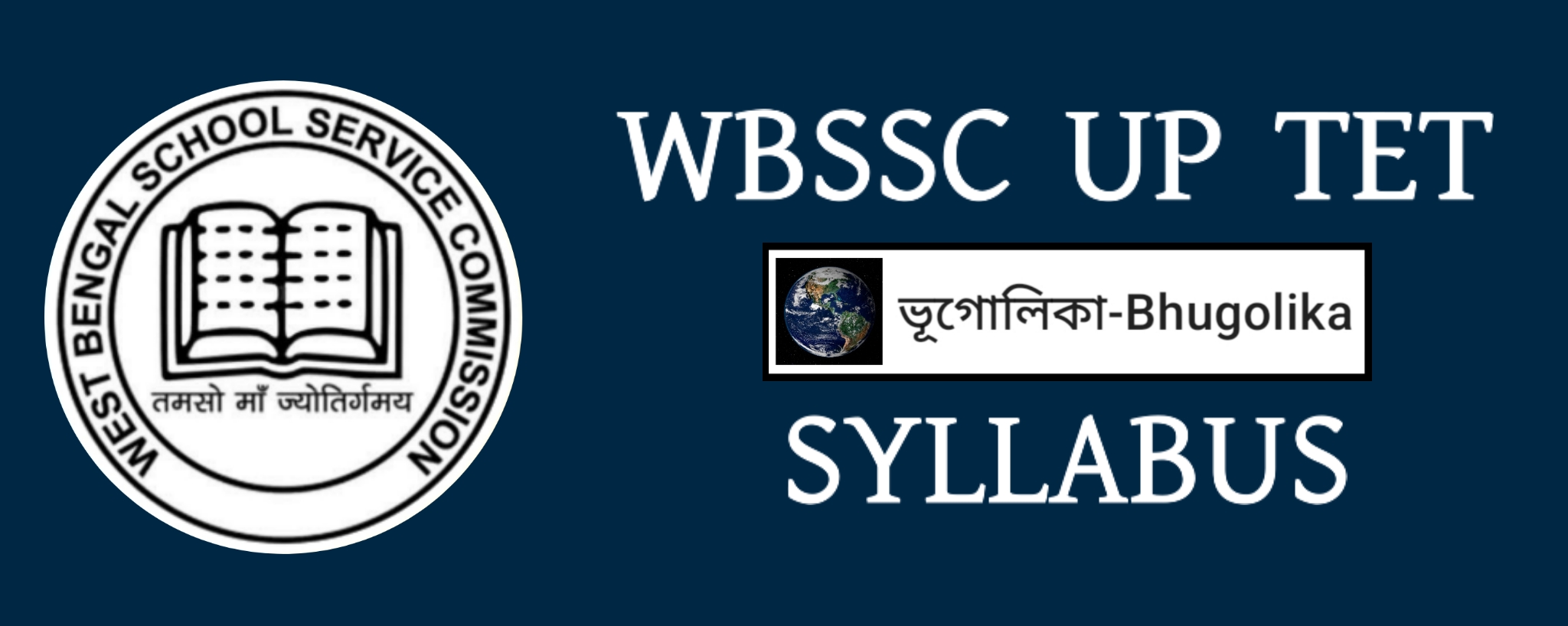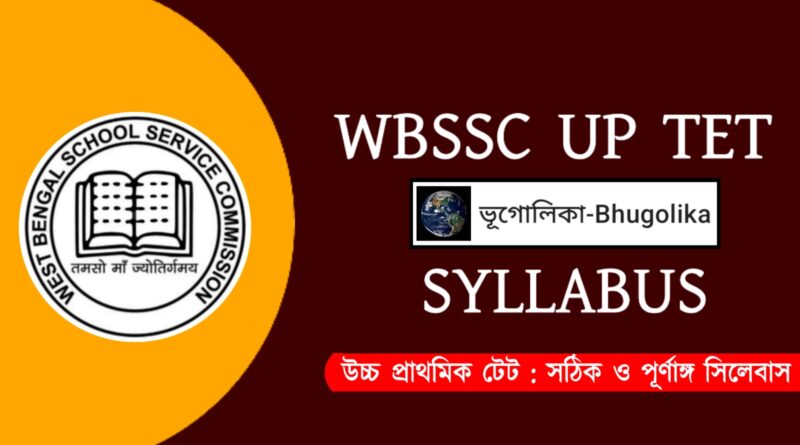WBSSC UP TET SYLLABUS
WBSSC UP TET SYLLABUS
আপনাকে ভূগোলিকা-Bhugolika -তে স্বাগত জানাই। এই পোস্টে ষষ্ঠ থেকে অষ্টম শ্রেণী পর্যন্ত শিক্ষক/শিক্ষিকা নিয়োগের জন্য পশ্চিমবঙ্গ স্কুল সার্ভিস কমিশন (WBSSC)-এর উচ্চ প্রাথমিক টেট (UPPER PRIMARY TET) পরীক্ষার পাঠ্যসূচি (WBSSC UP TET SYLLABUS) আলোচনা করা হল।

WBSSC UP TET SYLLABUS
পশ্চিমবঙ্গ স্কুল সার্ভিস কমিশন (WBSSC) প্রদত্ত উচ্চ প্রাথমিক টেট/ আপার প্রাইমারি টেট (UPPER PRIMARY TET) পরীক্ষার পাঠ্যসূচিতে ৪ টি ইউনিট রয়েছে —
🔷 ইউনিট-(I) শিশু বিকাশ ও শিক্ষাবিজ্ঞান (Child Development & Pedagogy) [মোট নম্বর – ৩০ ; ১ x ৩০ = ৩০]
🔷 ইউনিট-(II) প্রথম ভাষা : বাংলা (First Language : Bengali) [মোট নম্বর – ৩০ ; ১ x ৩০ = ৩০]
🔷 ইউনিট-(III) দ্বিতীয় ভাষা : ইংরেজি (Second Language : English) [মোট নম্বর – ৩০ ; ১ x ৩০ = ৩০]
🔷 ইউনিট-(IV) (IV)—(A) গণিত ও বিজ্ঞান (Mathematics & Science) [মোট নম্বর – ৬০ ; ১ x ৬০ = ৬০] [শুধুমাত্র বিজ্ঞান বিভাগের পরীক্ষার্থীদের জন্য]
অথবা,
(IV)—(B) সমাজ বিদ্যা (Social Studies) [মোট নম্বর – ৬০ ; ১ x ৬০ = ৬০] [কলা ও বাণিজ্য বিভাগের পরীক্ষার্থীদের জন্য]
WBSSC UP TET EXAMINATION
মোট নম্বর (Total Marks) : ১৫০
প্রশ্নের ধরন (Type of Questions) : MCQ
প্রশ্নের সংখ্যা (Number of Questions) : ১৫০
সময় (Time) : ১:৩০ ঘন্টা (৯০ মিনিট)
WBSSC UP TET SYLLABUS
ইউনিট-(I) শিশু বিকাশ ও শিক্ষাবিজ্ঞান (Child Development & Pedagogy) [মোট নম্বর – ৩০]
(A) শিশু বিকাশ (প্রাথমিক বিদ্যালয় শিশু) [Child Development (Elementary School Child)] [মোট নম্বর – ১৫]
- বিকাশের ধারণা এবং শিখনের সাথে তার সম্পর্ক [Concept of Development and Its relationship with Learning]
- শিশুর বিকাশের মূলনীতি [Principles of the Development of Children]
- বংশগতি ও পরিবেশের প্রভাব [Influence of Heredity & Environment]
- সামাজিকীকরণ পদ্ধতি : সামাজিক জগৎ এবং শিশু (শিক্ষক, পিতামাতা, সহপাঠী) [Socialization Processes : Social World & Children (Teacher, Parents, Peers)
- পিয়াজে, কোহলবার্গ ও ভাইগটস্কি : গঠন ও সমালোচনামূলক দৃষ্টিভঙ্গি [Piaget, Kohlberg and Vygotsky : Constructs and Critical Perspectives]
- শিশু-কেন্দ্রিক ও প্রগতিশীল শিক্ষার ধারণা [Concepts of Child-centred and Progressive Education]
- বুদ্ধিমত্তা গঠনের সমালোচনামূলক দৃষ্টিভঙ্গি [Critical Perspective of the Construct of Intelligence]
- বহুমাত্রিক বুদ্ধিমত্তা [Multi-Dimensional Intelligence]
- ভাষা ও চিন্তা [Language & Thought]
- এক সামাজিক নির্মাণ হিসাবে লিঙ্গ ; লিঙ্গ ভূমিকা, লিঙ্গ বৈষম্য ও শিক্ষামূলক অনুশীলন [Gender as a Social Construct ; Gender Roles, Gender-bias and Educational Practice]
- শিক্ষার্থীদের মধ্যে ব্যক্তিগত পার্থক্য ; ভাষা, জাতি, লিঙ্গ, সম্প্রদায়, ধর্ম ইত্যাদির ভিত্তিতে পৃথকীকরণের বোধ [Individual differences among learners ; Understanding differences based on diversity of language, Caste, Gender, Community, Religion etc]
- শিখনের জন্য মূল্যায়ন এবং শিখনের মূল্যায়নের মধ্যে পার্থক্য ; বিদ্যালয়-নির্ভর মূল্যায়ন, ধারাবাহিক ও সার্বিক মূল্যায়ন : ধারণা ও অনুশীলন [The Distinction between Assessment for learning and Assessment of learning ; School-Based Assessment, Continuous & Comprehensive Evaluation : Perspective and Practice]
- শিক্ষার্থীদের দ্রুত মূল্যায়নের জন্য, শ্রেণীকক্ষে শিক্ষার্থীদের মধ্যে শিখন ও যুক্তিগ্রাহ্য চিন্তার ক্ষমতা বৃদ্ধির জন্য এবং শিক্ষার্থীর কৃতিত্বের মূল্যায়নের জন্য সঠিক প্রশ্ন পদ্ধতি [Formulating appropriate questions for assessing readiness levels of learners ; for enhancing learning and critical thinking in the classroom and for assessing learner achievement]
(B) অন্তর্ভুক্তিমূলক/ব্যাপক শিক্ষার ধারণা এবং বিশেষ চাহিদা সম্পন্ন শিশুর ধারণা [Concept of Inclusive Education & Understanding Children with Special Needs] [মোট নম্বর – ০৫]
- ব্যতিক্রমী শিশু এবং বিশেষ চাহিদা সম্পন্ন শিশু (CWSN)-এর ধারণা [Concept of Exceptional Children and Children with Special Needs (CWSN)]
- অনগ্রসর ও বঞ্চিত সহ বিবিধ পরিবেশের শিক্ষার্থীদের শিক্ষা
[Addressing learners from diverse backgrounds including disadvantaged and deprived] - ‘অক্ষমতা/প্রতিবন্ধকতা’ ইত্যাদি শিখন অসুবিধাযুক্ত শিশুদের শিক্ষা [Addressing the needs of children with learning difficulties, ‘impairment’ etc]
- প্রতিভাবান, সৃজনশীল ও বিশেষ ক্ষমতা সম্পন্ন শিক্ষার্থীদের শিক্ষা [Addressing the Talented, Creative, Specially Abled Learners]
(C) শিখন ও শিক্ষাবিজ্ঞান [Learning & Pedagogy] [মোট নম্বর – ১০]
- শিশুদের মধ্যে শিখনের বিকল্প ধারণা [Alternative Concepts of Learning in Children]
- প্রজ্ঞা এবং প্রক্ষোভ [Cognition and Emotions]
- প্রেষণা এবং শিখন [Motivation and Learning]
- শ্রেণীকক্ষ ব্যবস্থাপনা [Class-room Management]
- শাস্তিবিধান এবং এর আইনি প্রভাব, একটি শিশুর অধিকার [Punishment and Its legal implications, Rights of a Child]
- নির্দেশনা এবং পরামর্শ : ধারণা, প্রকৃতি ও প্রকারভেদ
[Guidance and Counselling : Concept, Nature and Types] - কিভাবে শিশুরা চিন্তা করে ও শেখে ; কিভাবে ও কেন শিশুরা বিদ্যালয় কর্ম সম্পাদনে সাফল্য অর্জনে ‘ব্যর্থ’ হয় [How children think and learn ; How and Why children ‘fail’ to achieve success in school performance]
- শিক্ষণ ও শিখনের মৌলিক পদ্ধতি [Basic Processes of Teaching and Learning]
- শিশুদের শিখনের কৌশল ; সামাজিক কাজ হিসাবে শিখন ; শিখনের সামাজিক প্রসঙ্গ [Children’s Strategies of Learning ; Learning as a Social Activity ; Social Context of Learning]
- এক সমস্যা সমাধানকারী এবং এক ‘বৈজ্ঞানিক অনুসন্ধানকারী’ হিসাবে শিশু [Child as a Problem Solver and a ‘Scientific Investigator’]
- শিশুদের শিখনের বিকল্প ধারণা, শিখন প্রক্রিয়ার গুরুত্বপূর্ণ ধাপ হিসেবে শিশুদের ‘ত্রুটিগুলি’ বোঝা [Alternative Conceptions of Learning in Children, Understanding Children’s ‘Errors’ as significant steps in the Learning Process]
- শিখনের প্রভাবকগুলি – ব্যক্তিগত ও পরিবেশগত [Factors Contributing to Learning – Personal & Environmental]
ইউনিট-(II) প্রথম ভাষা : বাংলা (First Language : Bengali) [মোট নম্বর – ৩০]
(A) ভাষাগত বোধ পরীক্ষণ (Language Comprehension) [মোট নম্বর – ১৫]
- অজানা পরিচ্ছদ পাঠ — বোধ পরীক্ষণ, সিদ্ধান্ত, ব্যাকরণ ও শব্দগত দক্ষতার ওপর প্রশ্ন সহ দুটি পরিচ্ছদ — একটি গদ্য বা নাটক এবং একটি কবিতা।
(B) ভাষা বিকাশের শিক্ষাবিজ্ঞান (Pedagogy of Language Development) [মোট নম্বর – ১৫]
- বিবিধ শ্রেণীকক্ষে ভাষা শিক্ষণের সমস্যা : ভাষার অসুবিধা, ভুলভ্রান্তি ও অসংগতি [Challenges of teaching language in diverse classrooms : Language difficulties, errors and disorders]
- বাংলা ধ্বনিতত্ত্বের ভূমিকা : স্বরবর্ণ ও ব্যঞ্জনবর্ণ, শব্দ বিভাগ [Introduction to Bengali Phonology : Vowels and Consonants, Syllable Division]
- ভাষাগত বোধ পরীক্ষণের মূল্যায়ন ও LSRW-তে দক্ষতা (শ্রবণ, কথন, পঠন ও লিখন) [Evaluating language comprehension and proficiency in LSRW (Listening, Speaking, Reading and Writing)]
- শিক্ষণ-শিখন উপকরণ : পাঠ্যপুস্তক, বহুমাধ্যম উপকরণ, শ্রেণীকক্ষের বহুভাষিক সম্পদ [Teaching-Learning Materials : Textbook, Multimedia Materials, Multilingual Resource of the Classroom]
- বিশেষ চাহিদা সম্পন্ন শিশুদের (CWSN) শিক্ষণের জন্য কৌশল [Strategies for teaching children with special needs (CWSN)]
- প্রতিকারমূলক/সংশোধনী শিক্ষণ [Remedial Teaching]
- শিখন ও অর্জন [Learning and Acquisition]
- ভাষা শিক্ষণের মূলনীতি [Principles of Language Teaching]
- শ্রবণ ও কথনের ভূমিকা ; ভাষার কার্যাবলী এবং কিভাবে শিশুরা এটিকে এক সাধনী হিসাবে ব্যবহার করে [Role of listening and speaking ; function of language and how children use it as a tool]
- মৌখিক এবং লিখিত আকারে ধারণা প্রকাশের জন্য ভাষা শিখনের ক্ষেত্রে ব্যাকরণের ভূমিকা সম্পর্কে সমালোচনামূলক দৃষ্টিভঙ্গি [Critical perspective on the role of grammar in learning a language for communicating ideas verbally and in written form]
- ভাষা দক্ষতা [Language Skills]
ইউনিট-(III) দ্বিতীয় ভাষা : ইংরেজি (Second Language : English) [মোট নম্বর – ৩০]
(A) Language Comprehension [মোট নম্বর – ১৫]
- Two passages, one from prose and the other from poetry with questions on comprehension, inference, grammar and test of vocabulary
(B) Pedagogy of Language Development [মোট নম্বর – ১৫]
- Challenges of teaching language in diverse classrooms : Language difficulties, errors and disorders
- Introduction to English Phonology : Vowels and Consonants, Syllable Division
- Evaluating language comprehension and proficiency in LSRW (Listening, Speaking, Reading and Writing)
- Teaching-Learning Materials : Textbook, Multimedia Materials, Multilingual Resource of the Classroom
- Strategies for teaching children with special needs (CWSN)
- Remedial Teaching
- Learning and Acquisition
- Principles of Language Teaching
- Role of listening and speaking ; function of language and how children use it as a tool
- Critical perspective on the role of grammar in learning a language for communicating ideas verbally and in written form
- Language Skills
ইউনিট-(IV)—(A) গণিত ও বিজ্ঞান (Mathematics & Science) [মোট নম্বর – ৬০] [শুধুমাত্র বিজ্ঞান বিভাগের পরীক্ষার্থীদের জন্য]
(I) গণিত (Mathematics) [মোট নম্বর – ৩০]
(A) বিষয়বস্তু (Content) [মোট নম্বর – ২০]
♦️ সংখ্যা পদ্ধতি (Number System)
- সংখ্যার ধারণা [Knowing Our Numbers], সংখ্যা নিয়ে খেলা [Playing with Numbers], সম্পূর্ণ সংখ্যা [Whole Numbers], ঋণাত্মক সংখ্যা ও পূর্ণসংখ্যা [Negative Numbers & Integers], ভগ্নাংশ [Fractions]
♦️ বীজগণিত (Algebra)
- বীজগণিতের ধারণা [Introduction to Algebra], অনুপাত ও সমানুপাত [Ratio & Proportion]
♦️ জ্যামিতি (Geometry)
- মৌলিক জ্যামিতিক ধারণা (দ্বি-মাত্রিক) [Basic Geometrical Ideas (2-D)], প্রাথমিক আকারের ধারণা (দ্বি-মাত্রিক ও ত্রি-মাত্রিক) [Understanding Elementary Shapes (2-D and 3-D)], প্রতিসাম্য : প্রতিফলন [Symmetry : Reflection], অঙ্কন (সোজা প্রান্ত স্কেল, চাঁদা ও কম্পাস ব্যবহার করে) [Construction (Using Straight Edge Scale, Protractor, Compasses)]
♦️ পরিমিতি (Mensuration)
♦️ রাশিতথ্য পরিচালনা (Data Handling)
(B) শিক্ষাবৈজ্ঞানিক বিষয় (Pedagogical Issues) [মোট নম্বর – ১০]
- গণিত/যৌক্তিক চিন্তার প্রকৃতি [Nature of Mathematics/Logical Thinking], পাঠ্যক্রমে গণিতের স্থান [Place of Mathematics in Curriculum], গণিতের ভাষা [Language of Mathematics], গোষ্ঠী গণিত [Community Mathematics], মূল্যায়ন [Evaluation], প্রতিকারমূলক/সংশোধনী শিক্ষণ [Remedial Teaching], শিক্ষণের সমস্যা [Problem of Teaching]
(II) বিজ্ঞান (Science) [মোট নম্বর – ৩০]
(A) বিষয়বস্তু (Content) [মোট নম্বর – ২০]
♦️ খাদ্য (Food)
- খাদ্যের উৎস [Sources of Food], খাদ্যের উপাদান [Components of Food], খাদ্য পরিচ্ছন্নতা [Cleaning of Food]
♦️ উপকরণ (Materials)
- দৈনন্দিন ব্যবহারের উপকরণ [Materials of Daily Use]
♦️ জীবজগৎ (The World of the Living)
♦️ গতিশীল বস্তু – মানুষ ও ধারণা (Moving Things – People & Ideas)
♦️ কিভাবে বস্তু কাজ করে (How Things Work)
- তড়িৎ প্রবাহ ও আবর্তন [Electric Current & Circuits], চুম্বক [Magnets]
♦️ প্রাকৃতিক ঘটনা (Natural Phenomena)
♦️ প্রাকৃতিক সম্পদ (Natural Resources)
(B) শিক্ষাবৈজ্ঞানিক বিষয় (Pedagogical Issues) [মোট নম্বর – ১০]
- বিজ্ঞানের প্রকৃতি ও গঠন [Nature & Structure of Sciences], প্রাকৃতিক বিজ্ঞান : লক্ষ্য ও উদ্দেশ্য [Natural Science : Aims & Objectives], বিজ্ঞান উপলব্ধি ও গুণাবলী [Understanding & Appreciating Science], দৃষ্টিভঙ্গিসমূহ ও সমন্বিত দৃষ্টিভঙ্গি [Approaches & Integrated Approach], পর্যবেক্ষণ/পরীক্ষা/আবিষ্কার (বিজ্ঞানের পদ্ধতি) [Observation/Experiment/Discovery (Method of Science)], উদ্ভাবন [Innovation], পাঠ্য উপকরণ ও সামগ্রী [Text Material & Aids], মূল্যায়ন প্রজ্ঞামূলক/সাইকোমোটর/ অনুভূতিশীল [Evaluation – cognitive/psychomotor/affective], প্রতিকারমূলক/সংশোধনী শিক্ষণ [Remedial Teaching], শিক্ষণের সমস্যা [Problem of Teaching]
ইউনিট-(IV)—(B) সমাজ বিদ্যা (Social Studies) [মোট নম্বর – ৬০] [শুধুমাত্র কলা ও বাণিজ্য বিভাগের পরীক্ষার্থীদের জন্য]
(I) বিষয়বস্তু (Content) [মোট নম্বর – ৪০]
♦️ ইতিহাস (History)
- কখন, কোথায়, কিভাবে [When, Where & How], প্রাচীনতম সমাজ [The Earliest Societies], প্রথম কৃষক ও পশুপালক [The First Farmers & Herders], প্রথম নগর [The First Cities], প্রারম্ভিক রাজ্য [Early States], নব্য ধারণা [New Ideas], প্রথম সাম্রাজ্য [The First Empire], দূরবর্তী দেশের সাথে যোগাযোগ [Contacts with Distant Lands], রাজনৈতিক ক্রমবিকাশ [Political Developments], সংস্কৃতি ও বিজ্ঞান [Culture & Science], নতুন রাজা ও রাজ্য [New Kings & Kingdoms], দিল্লির সুলতানি শাসন [Sultanate of Delhi], স্থাপত্য [Architecture], সাম্রাজ্যের সূচনা [Creation of an Empire], সামাজিক পরিবর্তন [Social Change], আঞ্চলিক সংস্কৃতি [Regional Culture], কোম্পানির শাসনের প্রতিষ্ঠা [The Establishment of Company Power], গ্রামীণ জীবন ও সমাজ [Rural Life & Society], উপনিবেশবাদ ও উপজাতি সমাজ [Colonialism & Tribal Societies], ১৮৫৭-৫৮ -এর বিদ্রোহ [The Revolt of 1857-58], নারী ও সংস্কার [Women & Reform], বর্ণ ব্যবস্থাকে সংপ্রশ্ন [Challenging the Caste System], জাতীয়তাবাদী আন্দোলন [The Nationalist Movement], স্বাধীনতা পরবর্তী ভারত [India after Independence]
♦️ ভূগোল (Geography)
- সমাজ বিদ্যা এবং সমাজ বিজ্ঞান হিসাবে ভূগোল [Geography as a Social Study & as a Science], গ্রহ : সৌরজগৎ-এ পৃথিবী [Planet : Earth in Solar System], ভূ-গোলক [Globe], সামগ্রিকতায় পরিবেশ – প্রাকৃতিক ও মানব [Environment in its totality – Natural & Human Environment], বায়ু [Air], জল [Water], মানব পরিবেশ – জনবসতি, পরিবহণ ও যোগাযোগ [Human Environment – Settlement, Transport & Communication], সম্পদ : প্রকার – প্রাকৃতিক ও মানব [Resources : Types – Natural & Human], কৃষি [Agriculture]
♦️ সামাজিক ও রাজনৈতিক জীবন (Social & Political Life)
- বৈচিত্র্য [Diversity], সরকার [Government], স্থানীয় সরকার [Local Government], জীবিকা নির্বাহ [Making a Living], গণতন্ত্র [Democracy], রাজ্য সরকার [State Government], গণমাধ্যমের ধারণা [Understanding Media], লিঙ্গ বিশ্লেষণ [Unpacking Gender], সংবিধান [Constitution], সংসদীয় শাসনব্যবস্থা [Parliamentary Government], বিচারবিভাগ [The Judiciary], সামাজিক ন্যায় ও প্রান্তিক সমাজ [Social Justice & the marginalised]
(II) শিক্ষাবৈজ্ঞানিক বিষয় (Pedagogical Issues) [মোট নম্বর – ২০]
- সমাজ বিজ্ঞান/সমাজ বিদ্যার ধারণা ও প্রকৃতি [Concept & Nature of Social Science/Social Studies], শ্রেণীকক্ষ প্রক্রিয়া, কার্যকলাপ ও আলোচনা [Classroom Processes, Activities & Discourses], সমালোচনামূলক চিন্তনের বিকাশ [Developing Critical Thinking], অনুসন্ধান/অভিজ্ঞতামূলক প্রমাণ [Enquiry/Empirical Evidence], শিক্ষণের সমস্যা – সমাজ বিজ্ঞান/সমাজ বিদ্যা [Problem of Teaching – Social Science/Social Studies], উৎস – প্রাথমিক ও গৌণ [Sources – Primary & Secondary], প্রকল্প কর্ম [Project Works], মূল্যায়ন [Evaluation]
(WBSSC UP TET SYLLABUS ভূগোলিকা-Bhugolika)
(WBSSC UP TET SYLLABUS ভূগোলিকা-Bhugolika)
SSC Upper Primary TET Social Studies (Bengali Version)

Pingback: WBBPE PRIMARY TET SYLLABUS - ভূগোলিকা-Bhugolika
Pingback: TGT-PGT GEOGRAPHY PART-10 - ভূগোলিকা-Bhugolika
Pingback: WBSSC GROUP-D SYLLABUS - ভূগোলিকা-Bhugolika